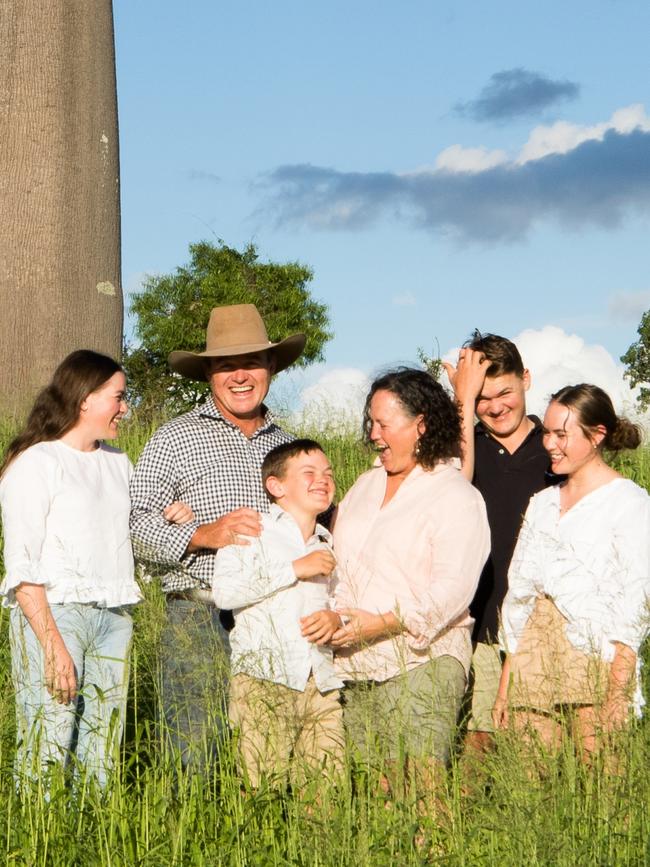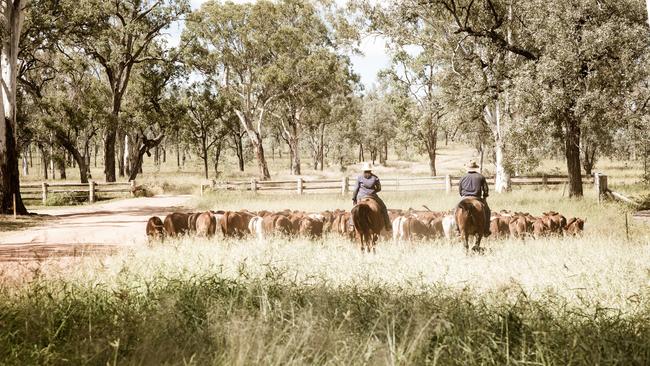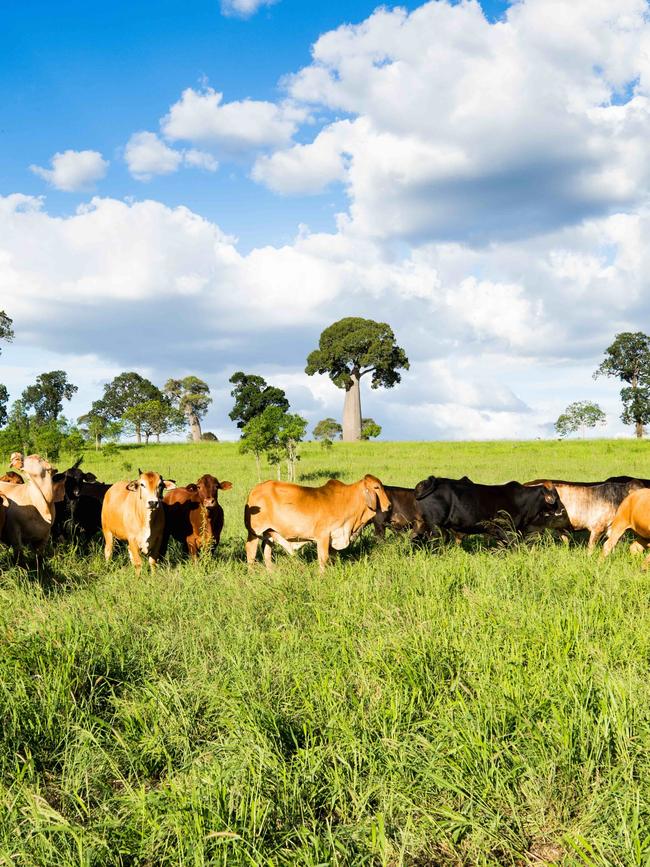Beef worth bottling at Monto
Respecting the environment and caring for their herd is bringing top results for the Burnham family at their organic enterprise in Queensland.
The Burnham family aren’t just beef producers, they are soil and grass farmers too.
And with a motto of tread as gently as possible on the earth, everything they do is balanced around harmony between family, the environment and the industry.
Carly and Grant Burnham, along with their children Lily, Ruby, Knox and Quade, operate Bonnie Doone Beef on their 8094ha property at Monto in the North Burnett region of Queensland.
The organic grass-fed beef producers run between 2500 and 3500 cattle, operate a direct to consumer beef brand, as well as a sawmill for sustainably harvesting eucalypt forest and a farm stay called Bloodwood Cabin.
At Bonnie Doone the philosophy is to give back more than they take. In a practical sense it means working in sync with nature and focusing on regeneration of the earth and improvement of soils, while producing nourishing beef.

Fifth generation farmers, Carly and Grant purchased Bonnie Doone in 2002 which became an addition to their generational family properties since the 1920s and 1950s. They started organic production in 2013 and became organic certified in 2016.
“Prior to that we were fairly mainstream farmers, but the pivotal moment was when we had four little kids and we were realising the state of the climate and planet. We really started to think about what part we played with the health of the land and the health of our family,” Carly said.
So after that realisation, Carly said they strategically transitioned to organic production meaning no chemical use, and they also changed the way they thought about and treated the land.
“We became gentler on the environment.”
Some of the major changes made when they became organic was in grazing management and nutrition of the cattle.
“A big challenge is ticks and parasites are difficult to manage in an organic system, so we started time controlled grazing because it breaks the tick and parasite cycle,” Carly said.
But this also meant an investment in a lot of infrastructure with fencing and water points.
Nutrition of the cattle was also a big change, with no urea or other synthetic inputs used to improve pasture.
“Our grazing system has meant we have fresher pasture for longer.”
VALUE-DRIVEN
Carly said there has also been a big mindset change.
“We had to problem solve and think differently about every aspect of the business. We had to flip and reimagine everything, but it was a good exercise.”
This shift in mindset and direction has meant they have become “a very values driven business and family”.
“We discovered what is important to us, found ways to implement that, while also ensuring we are profitable and gentle on the environment.”
“We have more abundance – in biodiversity, happiness, finances and contentment.”
In practical terms, Carly said farming in this way begins with observation.
“We observe what happens at different times of the year, what we need in terms of production and land, and what we are giving back.”
“It could mean reducing cattle numbers when the land is asking for it, instead of purely focusing on higher production.”

The property is in a subtropical climate, but has a fairly extreme temperature range, with high 30C temperatures in summer and below 0C in winter. The average annual rainfall is 650mm.
There are a wide range of soil types at Bonnie Doone including decomposed granite, alluvial black cracking clay, red volcanic soils and humus rich black basalt scrub soils.
MOBS ON THE MOVE
Cattle are grazed using time-controlled grazing method, through pulse grazing this allows the pasture to rest and be stimulated, which promotes life in the soil.
They have about 100 paddocks which each average about 60ha in size, with four mobs of cattle of 600 to 700 head each moving through the system.
“We move the cattle depending on the amount of rain and how much grass is growing. In the growing season they can be moving daily, but it slows right down during winter every four days.”
Carly said they use anecdotal evidence and grazing charts to measure the yield of the pasture, which determines how often cattle are moved.
“We aim for 100 per cent ground cover at all times.”
Water for the cattle is pumped from underground via solar technology into troughs, with the aim to conserve water as much as possible and capture as much running over the landscape to ensure it is made available to the plants and soil.
Carly said they also wanted any water on the property to be as clear as possible and sediment free to protect ecosystems downstream.
She said more ground cover has slowed the water down and as a result it is much cleaner.
The Bonnie Doone cattle are a stabilised composite breed based on Red Brangus and infused with Senepol.

Carly said they started on the composite breed about 30 years ago.
“In the mid 1990s we did a lot of focused genetic selection and developed the composite breed to get that hybrid vigour.”
“Before starting cell grazing we improved the productivity of our herd. We highly value fertility and cull any that don’t get pregnant and we measure a lot of traits.”
“We’ve created an adaptable, fertile and resilient herd.”
“There are environmental gains in having a productive beef herd, as they produce fewer emissions.”
Joining was for a 12-week period between December and March, with calving in October to January.
Most steers and heifers were then sold into export or domestic trade markets through the organic certified market chain and a small amount was sold direct to consumer through their Bonnie Doone Beef brand.
Coming up to 10 years since the beef brand was started, Carly said they had really seen a lot of growth with the direct to consumer beef.
“Our aim is to transition to more beef going to local customers.”
The Bonnie Doone Beef branded meat is sold within a 300km radius and monthly orders are taken, with delivery always done by one of the Burnham family members.
“We want to provide our region with the best beef and delivering it is the most rewarding part of our job. Having that interaction with customers.”
With animal welfare also an important piece of the puzzle, Carly said they preferred to transport cattle as little as possible. As such cattle were processed at the closest plant able to do organic meat, which was currently at Gympie.
Carly said they received a premium for organic beef and found it was also a more consistent price, making it more predictable.
The Burnhams also breed their own red bulls that are fertile, tropically adapted and calm. They use the bulls within their own herd and sell some each year throughout Queensland.
Cattle are all handled with gentle low stress practices, which leads to a happy animal with tender beef.
“There is a direct correlation between tenderness and stress.”
Carly said the feedback they received most from their customers was that their meat “tastes like real meat with flavour” and they loved knowing who produced it and that it was produced with no chemicals and the environment was taken care of.
TREES TREASURED
Trees are also a valuable resource at Bonnie Doone, for storing carbon, providing shelter for livestock and habitat for native animals. They manage a natural eucalypt forest on the property and sustainably harvest the timber, using it to build with on the property and sell to others locally.
They also have riparian land fenced off to promote biodiversity.
Carly said the farmstay was an important element to their business and brought mostly city people to the property, where they could learn about regenerative cattle management, experience the flora and fauna and eat Bonnie Doone beef.
“We think it is important to share our story with those with no connection to the land.”
To prove what they are doing is working, last year Bonnie Doone gained the distinction of becoming the largest holder of Australian Carbon Credit, following the implementation of a soil carbon project they started in 2016, which was run in conjunction with CarbonLink.
The Burnhams were issued with more than 94,000 Australian Carbon Credits from the Clean Energy Regulator, which means they have sequestered carbon in the soil. It equals to more than 120,000 tonnes of greenhouse gas emissions removed from the atmosphere
“It is evidence our soil is improving,” she said.
Another big achievement was Carly was named this year’s Organic Farmer of the Year at the Australian Organic Industry Awards.
And the Bonnie Doone enterprise looks to be in capable hands into the next generation.
Carly said all four children help out on University or school holidays and they all contribute in their own unique way.
“They are all able to contribute with their flair and unique skills.”
She said they were the Youth Board of Directors and they were invested in strategies for the future of the business.
“This is a generational business and the decisions we make impact them into the future, so it is important we have their involvement.”





